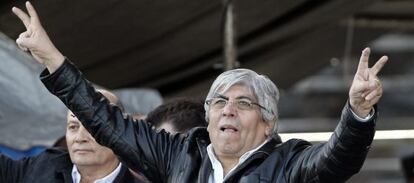Union boss calls for vote against Fernández
Truckers strike paralyzes most of Buenos Aires but fuel and cash still flow


One of Argentina's most powerful union leaders, Hugo Moyano, who was once a strong government ally, asked Argentineans on Monday to vote against President Cristina Fernández de Kirchner's Peronist faction in the upcoming legislative elections in October.
Moyano, the head of five major trucking unions, made the call during a 24-hour transportation strike that was supported by other labor groups.
"Let us be aware who we are going to vote for on October 27; let us not make any mistakes because that would be unforgivable," Moyano said at a rally at Plaza de Mayo in Buenos Aires.
Argentineans in the capital awoke to mounds of garbage left on the streets and newspapers and foodstuffs undelivered, but the strike didn't affect all services: there was still fuel at most filling stations and cash in automatic tellers.
The strike took place four days before the official start of the campaign in the legislative races, in which Moyano is running as deputy in a symbolic gesture. He is last on the 35-candidate anti-Kirchner Peronist slate, but with remote possibilities of getting elected.
Moyano and Fernández de Kirchner broke their alliance shortly after she was reelected to a second term in 2011 with 54 percent of the vote. The leader of one of three factions inside the powerful General Workers Confederation (CGT) wanted her to include more labor leaders as deputies in her Kirchner Peronist faction but the president did not give in.
In the face of a deteriorated economy, Moyano said that workers' salaries were not in line with inflation, which was listed at 23 percent last year, and complained about the income tax on wages the government has put in place. On Saturday, Moyano had said that the strike "was against the president and not against the workers."
The president's late husband and predecessor, Néstor Kirchner, had backed Moyano to head up a unified CGT union, which is now divided in three branches: one that backs the government and two opposition factions, including the truckers unions.
Moyano was one of the few labor leaders to oppose the neoliberal policies, including the privatizations and reductions in public payroll, introduced by former President Carlos Menem, who governed from 1989 to 1999.
When in 2008 a picket line of agriculture workers in the small town of Ceibas threatened to cut the flow of goods to Uruguay and Brazil, Moyano sent his representatives to break it up. During his years as Kirchner's ally, he gained the admiration of many workers who attributed their pay hikes to him. But at the same time the middle class and the press became wary of reported secret financial transactions that he allegedly ran from his union's offices. When he broke off with Fernández de Kirchner at the end of 2011, the opposition embraced him and forgot all about the graft allegations.
The main battlefield in the upcoming elections will be in the populous Buenos Aires province, where four out of every 10 citizens are registered to vote. Moyano's slate is headed by Francisco de Narváez, a Peronist businessman who was aligned with Menem and an enemy of the Fernández de Kirchner government.
In 2009, De Narváez was able to beat the Fernández de Kirchner faction at the polls in the last legislative race but his failure to introduce any important legislation in Congress, internal bickering among his party officials, and a constitutional prohibition that bars him from running for president (he is Colombian by birth) has weakened his position among voters.
Tu suscripción se está usando en otro dispositivo
¿Quieres añadir otro usuario a tu suscripción?
Si continúas leyendo en este dispositivo, no se podrá leer en el otro.
FlechaTu suscripción se está usando en otro dispositivo y solo puedes acceder a EL PAÍS desde un dispositivo a la vez.
Si quieres compartir tu cuenta, cambia tu suscripción a la modalidad Premium, así podrás añadir otro usuario. Cada uno accederá con su propia cuenta de email, lo que os permitirá personalizar vuestra experiencia en EL PAÍS.
¿Tienes una suscripción de empresa? Accede aquí para contratar más cuentas.
En el caso de no saber quién está usando tu cuenta, te recomendamos cambiar tu contraseña aquí.
Si decides continuar compartiendo tu cuenta, este mensaje se mostrará en tu dispositivo y en el de la otra persona que está usando tu cuenta de forma indefinida, afectando a tu experiencia de lectura. Puedes consultar aquí los términos y condiciones de la suscripción digital.








































